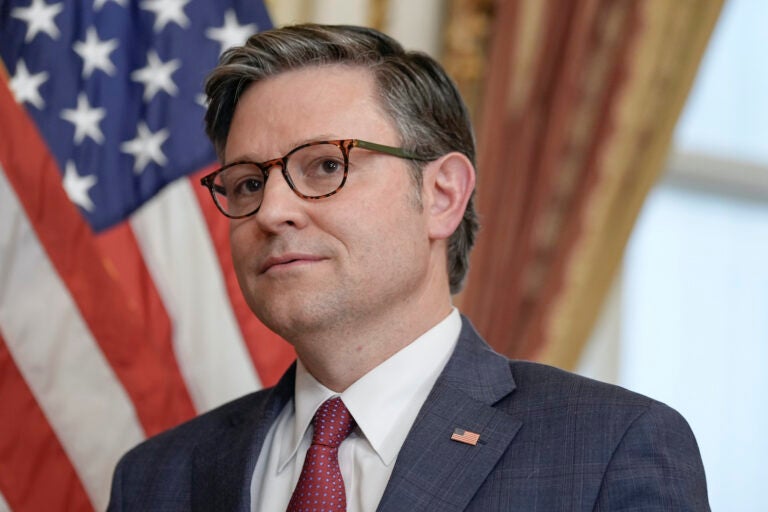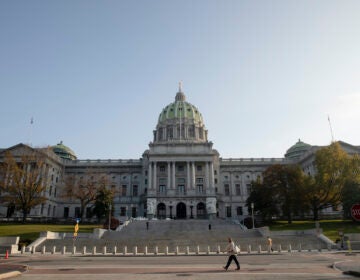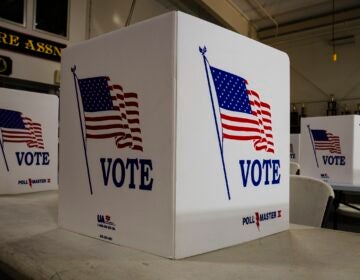House GOP wants proof of citizenship to vote, boosting an election-year talking point
The GOP is using Democratic opposition to the bill as fuel for Trump’s claims that Democrats have encouraged the surge of migrants so they can get them to register and vote.

Speaker of the House Mike Johnson, R-La., participates in a ceremonial swearing-in for Rep. Michael Rulli, R-Ohio, on Capitol Hill Tuesday, June 25, 2024, in Washington. (AP Photo/Mariam Zuhaib)
The U.S. House of Representatives on Wednesday was poised to vote on a proof-of-citizenship requirement for voter registration, a proposal Republicans have prioritized as an election-year talking point even as research shows noncitizens illegally registering and casting ballots in federal elections is exceptionally rare.
Even if it passes the GOP-controlled House, the legislation is unlikely to advance through the Democratic-led Senate. The Biden administration also said it’s strongly opposed because it says safeguards already are in place to verify voter eligibility and enforce the law against noncitizens trying to cast ballots.
Still, the House vote will give Republicans an opportunity to bring attention to two of their central issues in the 2024 race – border and election security. They also are using Democratic opposition to the bill as fuel for former President Donald Trump’s claims that Democrats have encouraged the surge of migrants so they can get them to register and vote, which would be illegal. Noncitizens are not allowed to vote in federal elections, nor is it allowed for any statewide elections.
Republican House Speaker Mike Johnson, a key backer of the bill, said in a news conference earlier this week that the Democratic opposition means many Democrats “want illegals to participate in our federal elections; they want them to vote.”
During a speech Wednesday previewing the expected House debate, he called the vote a “generation-defining moment.”
“If just a small percentage, a fraction of a fraction of all those illegals that Joe Biden has brought in here to vote, if they do vote, it wouldn’t just change one race,” he said. “It might potentially change all of our races.”
On his Truth Social platform this week, Trump suggested that Democrats are pushing to give noncitizen migrants the right to vote and urged Republicans to pass the legislation — the Safeguard American Voter Eligibility Act — or “go home and cry yourself to sleep.”
The fixation on noncitizen voting is part of a broader and long-term Trump campaign strategy of casting doubt on the validity of an election should he lose, and he has consistently pushed that narrative during his campaign rallies this year. Last month in Las Vegas, he told supporters, “The only way they can beat us is to cheat.” It also is part of a wider Republican campaign strategy, with GOP lawmakers across the country passing state legislation and putting noncitizen voting measures on state ballots for November.
Democrats and voting rights advocates have said the legislation is unnecessary because it’s already a felony for noncitizens to register to vote in federal elections, punishable by fines, prison or deportation. Anyone registering must attest under penalty of perjury that they are a U.S. citizen. Noncitizens also are not allowed to cast ballots at the state level. A handful of municipalities allow them to vote in some local elections.
“For all their hysterical rhetoric around the SAVE Act, Republicans have one real purpose here – to continue to erode the confidence of Americans in our election systems,” said Rep. Joe Morelle of New York, the top Democrat on the House Administration Committee.
They also have pointed to surveys showing that millions of Americans don’t have easy access to up-to-date documentary proof of citizenship, such as a birth certificate, naturalization certificate or passport, and therefore the bill could inhibit U.S. citizen voters who aren’t able to further prove their status.
If the bill were to pass, “it would not safeguard American voting eligibility but immediately disenfranchise millions of American citizens,” said Sean Morales-Doyle, director of voting rights at the Brennan Center for Justice.
Yet Republicans who support the bill say the recent unprecedented surge of migrants illegally crossing the U.S.-Mexico border creates too large a risk of noncitizens slipping through the cracks. They could purposely or inadvertently break the law to cast ballots that sway races amid narrow margins in November’s elections.
If passed, the bill would require noncitizens to be removed from state voter rolls and require new applicants to provide documentary proof of U.S. citizenship. It also would require states to establish a process for applicants who can’t show proof to provide other evidence beyond their attestation of citizenship, though it’s unclear what that evidence could include.
Research and audits in several states show that there have been incidences of noncitizens who successfully registered to vote and cast ballots, although it happens rarely and is typically by mistake. States have mechanisms to check for it, although there isn’t one standard protocol they all follow.
For example, Ohio Secretary of State Frank LaRose recently found 137 suspected noncitizens on the state’s rolls — out of roughly 8 million voters — and said he was taking action to confirm and remove them.
In 2022, Georgia’s Republican secretary of state, Brad Raffensperger, conducted an audit of his state’s voter rolls specifically looking for noncitizens. His office found that 1,634 had attempted to register to vote over a period of 25 years, but election officials had caught all the applications and none had been able to register.
In North Carolina in 2016, an audit of elections found that 41 legal immigrants who had not yet become citizens cast ballots, out of 4.8 million total ballots cast. The votes didn’t make a difference in any of the state’s elections.
In a document supporting the bill, Johnson listed other examples of noncitizens who had been removed from the rolls in Boston and Virginia. The elections departments there didn’t immediately answer questions from The Associated Press to verify the claims.
Several secretaries of state, interviewed during their summer conference in Puerto Rico this week, said noncitizens attempting to register and vote is not a big problem in their state.
Kentucky Secretary of State Michael Adams, a Republican, said that his state already requires photo ID to vote and that most people use a driver’s license. The state does not allow noncitizens living in the country illegally to get driver’s licenses, and he said only a “tiny universe” of noncitizen legal residents can get one.
As a result, “we don’t really have a problem with this in my state,” he said in an interview.
Utah Lt. Gov. Deidre Henderson, a Republican who oversees elections, said she supports the legislation in concept but provided a cautionary tale about how aggressively culling voter rolls can sometimes result in the removal of qualified voters. A few years ago, everyone in her household received mail ballots for a municipal election, except her. She had been removed from the rolls because she had been born in the Netherlands, where her father was stationed with the U.S. Air Force.
“I was the lieutenant governor, I was overseeing elections, and I got taken off because I was born in the Netherlands,” she said, “So I think we definitely have those checks and balances in the state of Utah, maybe to an extreme.”
The House vote comes days after the Republican National Committee released its party platform, which emphasizes border security issues and takes a stand against Democrats giving “voting rights” to migrants living in the country illegally.
Republicans are expected to shine a light on their immigration and election integrity concerns at the Republican National Convention next week in Milwaukee, where Trump is scheduled to accept his third straight nomination for president.
___
Swenson reported from New York. Associated Press writer Christina A. Cassidy in San Juan, Puerto Rico, contributed to this report.

Get daily updates from WHYY News!
WHYY is your source for fact-based, in-depth journalism and information. As a nonprofit organization, we rely on financial support from readers like you. Please give today.





